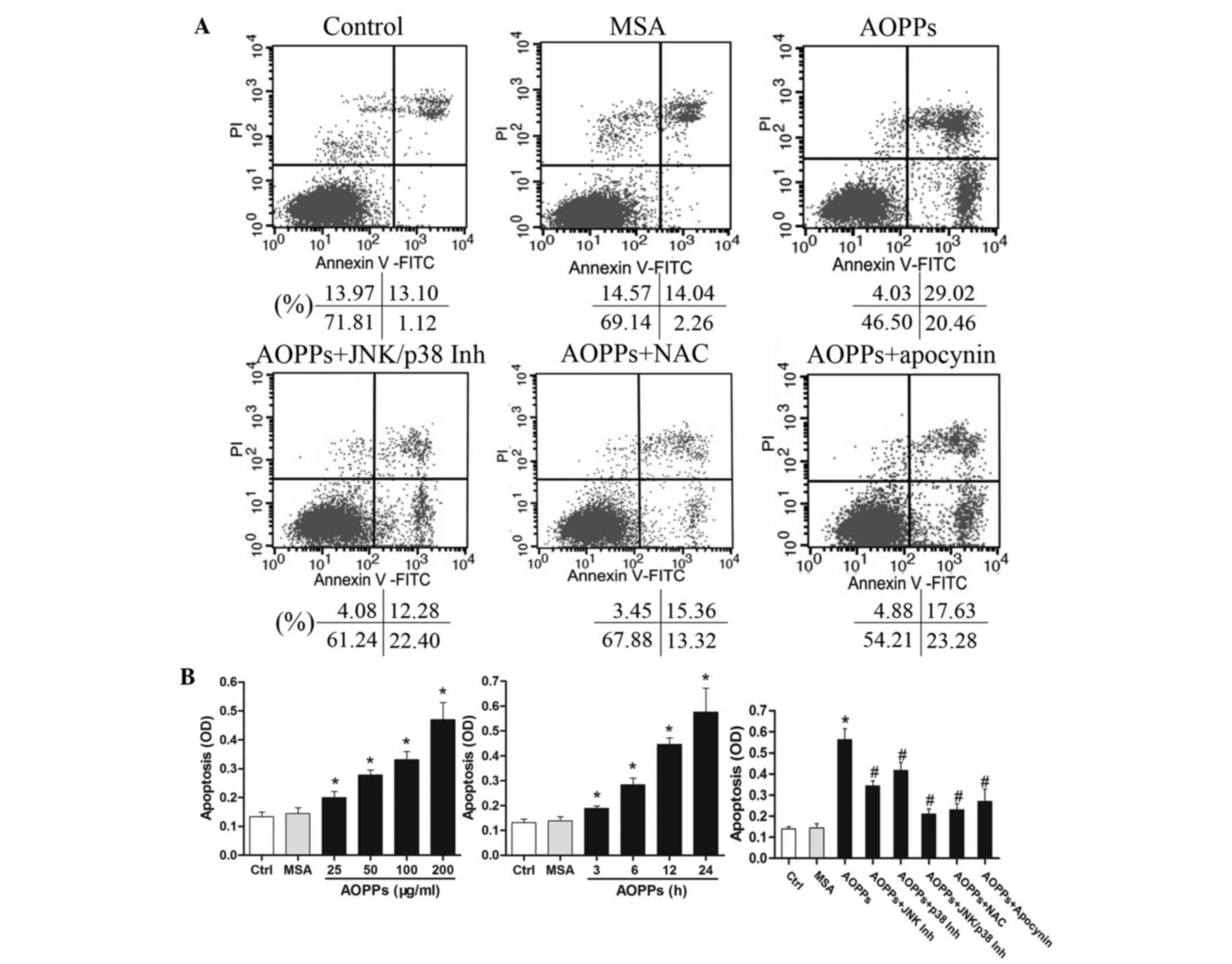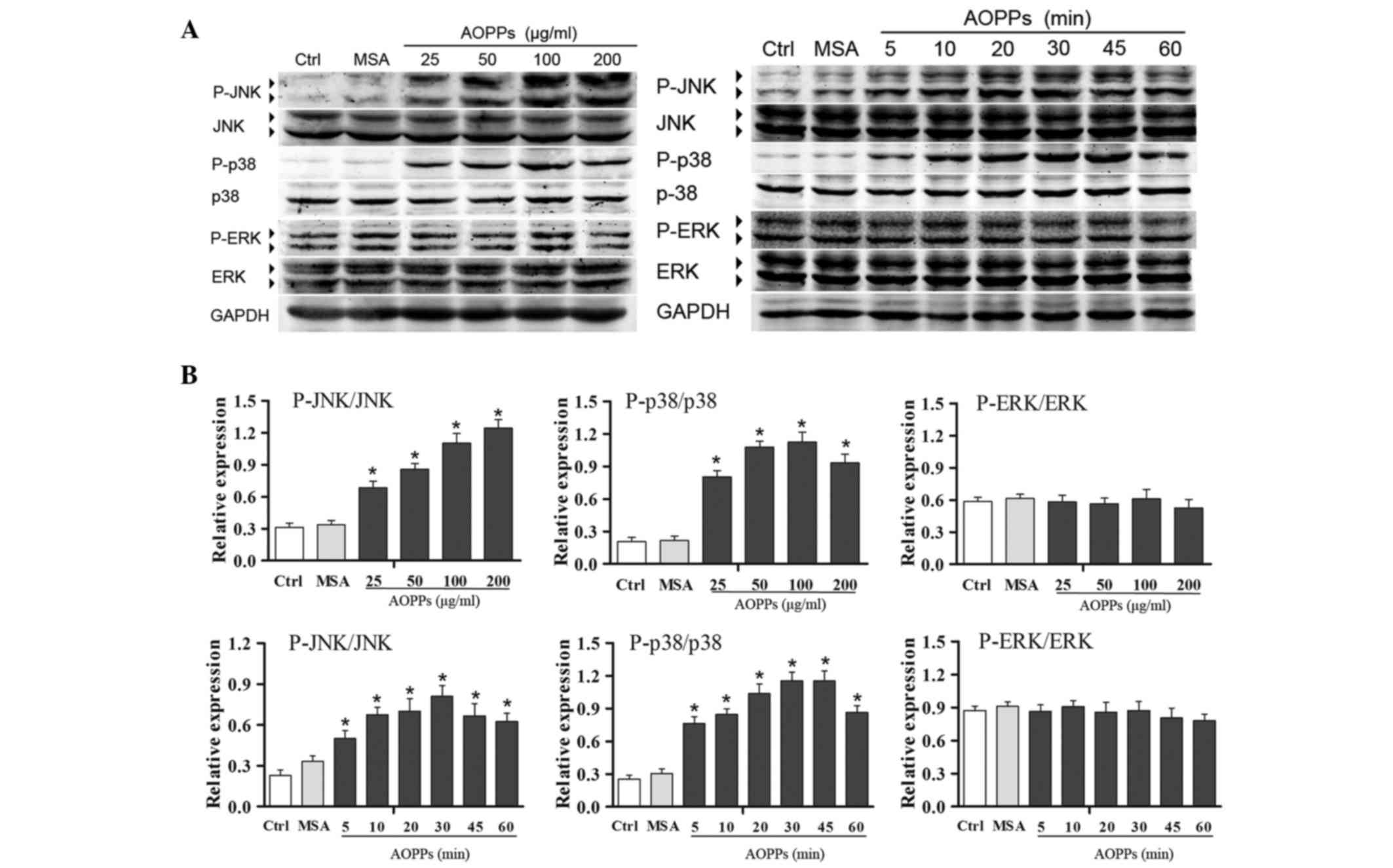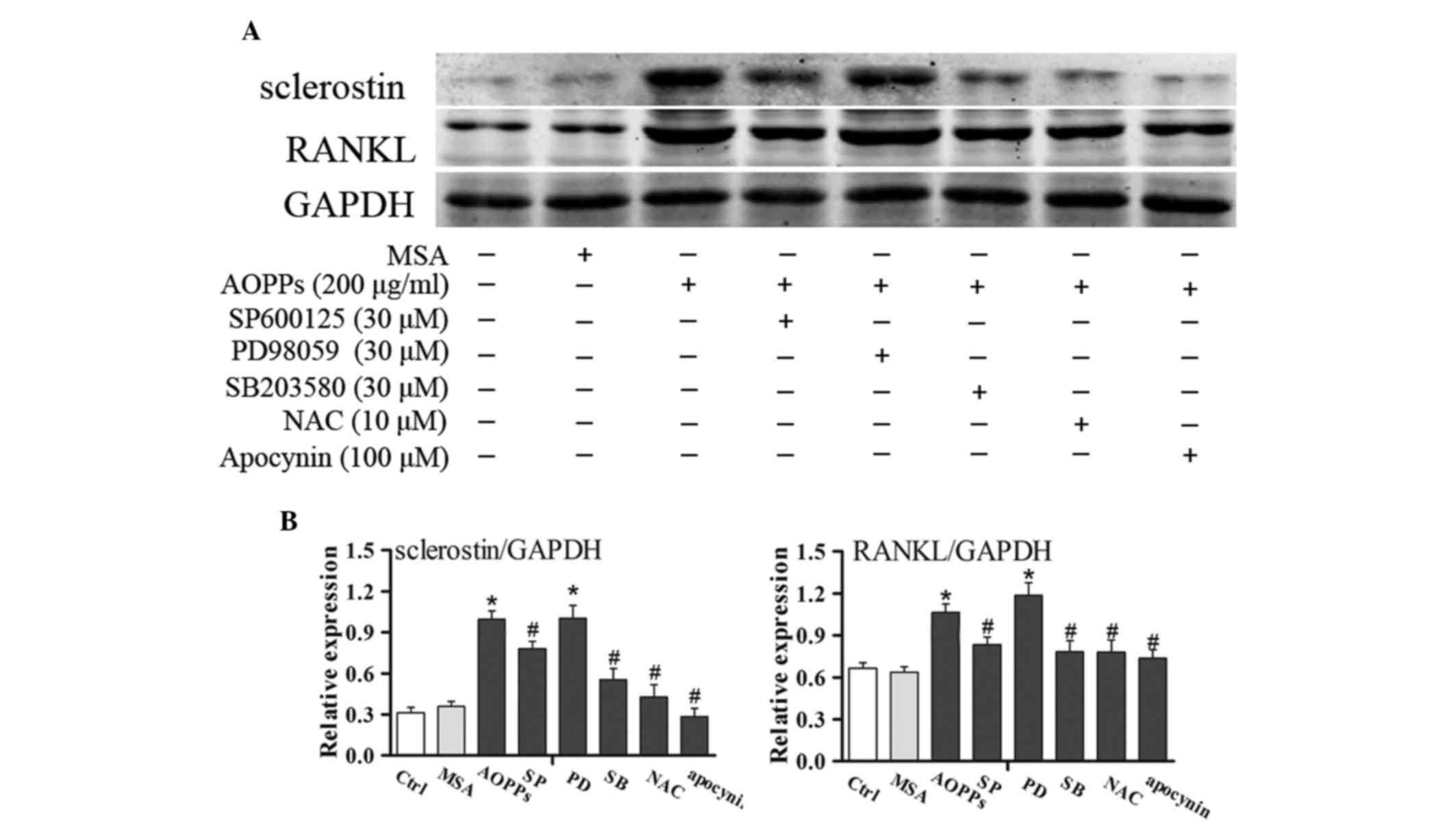|
1
|
Witko-Sarsat V, Friedlander M,
Capeillère-Blandin C, Nguyen-Khoa T, Zingraff J, Jungers P and
Descamps-Latscha B: Advanced oxidation protein products as a novel
marker of oxidative stress in uremia. Kidney Int. 49:1304–1313.
1996. View Article : Google Scholar : PubMed/NCBI
|
|
2
|
Witko-Sarsat V, Friedlander M, Khoa T
Nguyen, Capeillère-Blandin C, Nguyen AT, Canteloup S, Dayer JM,
Jungers P, Drüeke T and Descamps-Latscha B: Advanced oxidation
protein products as novel mediators of inflammation and monocyte
activation in chronic renal failure1, 2. J Immunol. 161:2524–2532.
1998.PubMed/NCBI
|
|
3
|
Tucker PS, Dalbo VJ, Han T and Kingsley
MI: Clinical and research markers of oxidative stress in chronic
kidney disease. Biomarkers. 18:103–115. 2013. View Article : Google Scholar : PubMed/NCBI
|
|
4
|
Krzystek-Korpacka M, Neubauer K, Berdowska
I, Boehm D, Zielinski B, Petryszyn P, Terlecki G, Paradowski L and
Gamian A: Enhanced formation of advanced oxidation protein products
in IBD. Inflamm Bowel Dis. 14:794–802. 2008. View Article : Google Scholar : PubMed/NCBI
|
|
5
|
Baskol G, Demir H, Baskol M, Kilic E, Ates
F, Karakukcu C and Ustdal M: Investigation of protein oxidation and
lipid peroxidation in patients with rheumatoid arthritis. Cell
Biochem Funct. 24:307–311. 2006. View
Article : Google Scholar : PubMed/NCBI
|
|
6
|
Piwowar A, Knapik-Kordecka M and Warwas M:
AOPP and its relations with selected markers of
oxidative/antioxidative system in type 2 diabetes mellitus.
Diabetes Res Clin Pract. 77:188–192. 2007. View Article : Google Scholar : PubMed/NCBI
|
|
7
|
Painter SE, Kleerekoper M and Camacho PM:
Secondary osteoporosis: A review of the recent evidence. Endocr
Pract. 12:436–445. 2006. View Article : Google Scholar : PubMed/NCBI
|
|
8
|
Zhong ZM, Bai L and Chen JT: Advanced
oxidation protein products inhibit proliferation and
differentiation of rat osteoblast-like cells via NF-kappaB pathway.
Cell Physol Biochem. 24:105–114. 2009. View Article : Google Scholar
|
|
9
|
Sun N, Yang L, Li Y, Zhang H, Chen H, Liu
D, Li Q and Cai D: Effect of advanced oxidation protein products on
the proliferation and osteogenic differentiation of rat mesenchymal
stem cells. Int J Mol Med. 32:485–491. 2013.PubMed/NCBI
|
|
10
|
Yasuda H, Shima N, Nakagawa N, Yamaguchi
K, Kinosaki M, Mochizuki S, Tomoyasu A, Yano K, Goto M, Murakami A,
et al: Osteoclast differentiation factor is a ligand for
osteoprotegerin/osteoclastogenesis-inhibitory factor and is
identical to TRANCE/RANKL. Proc Natl Acad Sci USA. 95:3597–3602.
1998. View Article : Google Scholar : PubMed/NCBI
|
|
11
|
Nakashima T, Hayashi M, Fukunaga T, Kurata
K, Oh-Hora M, Feng JQ, Bonewald LF, Kodama T, Wutz A, Wagner EF, et
al: Evidence for osteocyte regulation of bone homeostasis through
RANKL expression. Nat Med. 17:1231–1234. 2011. View Article : Google Scholar : PubMed/NCBI
|
|
12
|
Semenov M, Tamai K and Xi H: SOST is a
ligand for LRP5/LRP6 and a wnt signaling inhibitor. J Biol Chem.
280:26770–26775. 2005. View Article : Google Scholar : PubMed/NCBI
|
|
13
|
Krause C, Korchynskyi O, de Rooij K,
Weidauer SE, de Gorter DJ, van Bezooijen RL, Hatsell S, Economides
AN, Mueller TD, Löwik CW and ten Dijke P: Distinct modes of
inhibition by sclerostin on bone morphogenetic protein and Wnt
signaling pathways. J Biol Chem. 285:41614–41626. 2010. View Article : Google Scholar : PubMed/NCBI
|
|
14
|
Kyriakis JM and Avruch J: Mammalian
mitogen-activated protein kinase signal transduction pathways
activated by stress and inflammation. Physiol Rev. 81:807–869.
2001.PubMed/NCBI
|
|
15
|
Reddy KB, Nabha SM and Atanaskova N: Role
of MAP kinase in tumor progression and invasion. Cancer Metastasis
Rev. 22:395–403. 2003. View Article : Google Scholar : PubMed/NCBI
|
|
16
|
Livak KJ and Schmittgen TD: Analysis of
relative gene expression data using real-time quantitative PCR and
the 2-ΔΔCT method. Methods. 25:402–408. 2001. View Article : Google Scholar : PubMed/NCBI
|
|
17
|
Burotto M, Chiou VL, Lee JM and Kohn EC:
The MAPK pathway across different malignancies: A new perspective.
Cancer. 120:3446–3456. 2014. View Article : Google Scholar : PubMed/NCBI
|
|
18
|
Thouverey C and Caverzasio J: Focus on the
p38 MAPK signaling pathway in bone development and maintenance.
Bonekey Rep. 4:7112015. View Article : Google Scholar : PubMed/NCBI
|
|
19
|
Wang SS, Huang QT, Zhong M and Yin Q:
AOPPs (advanced oxidation protein products) promote apoptosis in
trophoblastic cells through interference with NADPH oxidase
signaling: Implications for preeclampsia. J Matern Fetal Neonatal
Med. 28:1747–1755. 2015. View Article : Google Scholar : PubMed/NCBI
|
|
20
|
Zhou LL, Cao W, Xie C, Tian J, Zhou Z,
Zhou Q, Zhu P, Li A, Liu Y, Miyata T, et al: The receptor of
advanced glycation end products plays a central role in advanced
oxidation protein products-induced podocyte apoptosis. Kidney Int.
82:759–770. 2012. View Article : Google Scholar : PubMed/NCBI
|
|
21
|
Xie F, Sun S, Xu A, Zheng S, Xue M, Wu P,
Zeng JH and Bai L: Advanced oxidation protein products induce
intestine epithelial cell death through a redox-dependent, c-jun
N-terminal kinase and poly (ADP-ribose) polymerase-1-mediated
pathway. Cell Death Dis. 5:e10062014. View Article : Google Scholar : PubMed/NCBI
|
|
22
|
Bonewald LF: The amazing osteocyte. J Bone
Res. 26:229–238. 2011. View
Article : Google Scholar
|
|
23
|
Compton JT and Lee FY: A review of
osteocyte function and the emerging importance of sclerostin. J
Bone Joint Surg Am. 96:1659–1668. 2014. View Article : Google Scholar : PubMed/NCBI
|
|
24
|
Seibel MJ, Cooper MS and Zhou H:
Glucocorticoid-induced osteoporosis: Mechanisms, management and
future perspectives. Lancet Diabetes Endocrinol. 1:59–70. 2013.
View Article : Google Scholar : PubMed/NCBI
|
|
25
|
Osone S, Hosoi H, Kuwahara Y, Matsumoto Y,
Iehara T and Sugimoto T: Fenretinide induces sustained-activation
of JNK/p38 MAPK and apoptosis in a reactive oxygen
species-dependent manner in neuroblastoma cells. Int J Cancer.
112:219–224. 2004. View Article : Google Scholar : PubMed/NCBI
|
|
26
|
Park GB, Choi Y, Kim YS, Lee HK, Kim D and
Hur DY: ROS-mediated JNK/p38-MAPK activation regulates bax
translocation in sorafenib-induced apoptosis of EBV-transformed B
cells. Int J Oncol. 44:977–985. 2014.PubMed/NCBI
|
|
27
|
Lee SY, Kang SU, Kim KI, Kang S, Shin YS,
Chang JW, Yang SS, Lee K, Lee JS, Moon E and Kim CH: Nonthermal
plasma induces apoptosis in ATC cells: Involvement of JNK and p38
MAPK-dependent ROS. Yonsei Med J. 55:1640–1647. 2014. View Article : Google Scholar : PubMed/NCBI
|
|
28
|
Palit S, Kar S, Sharma G and Das PK:
Hesperetin induces apoptosis in breast carcinoma by triggering
accumulation of Ros and activation of ASK1/JNK Pathway. J Cell
Physiol. 230:1729–1739. 2015. View Article : Google Scholar : PubMed/NCBI
|
|
29
|
Winkler DG, Sutherland MK, Geoghegan JC,
Yu C, Hayes T, Skonier JE, Shpektor D, Jonas M, Kovacevich BR,
Staehling-Hampton K, et al: Osteocyte control of bone formation via
sclerostin, a novel BMP antagonist. EMBO J. 22:6267–6276. 2003.
View Article : Google Scholar : PubMed/NCBI
|
|
30
|
Wijenayaka AR, Kogawa M, Lim HP, Bonewald
LF, Findlay DM and Atkins GJ: Sclerostin stimulates osteocyte
support of osteoclast activity by a RANKL-dependent pathway. PloS
one. 6:e259002011. View Article : Google Scholar : PubMed/NCBI
|
|
31
|
Kostenuik PJ, Smith SY, Jolette J,
Schroeder J, Pyrah I and Ominsky MS: Decreased bone remodeling and
porosity are associated with improved bone strength in
ovariectomized cynomolgus monkeys treated with denosumab, a fully
human RANKL antibody. Bone. 49:151–161. 2011. View Article : Google Scholar : PubMed/NCBI
|



















